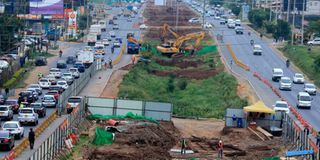We’re exporting taxes by the shovel

Road construction work of the Nairobi expressway project on Mombasa Road which China Road and Bridge Corporation (CRBC) has been contracted to do.
What you need to know:
- Over the past eight years, we have given four Chinese firms construction contracts worth Sh4 trillion, according to our research.
- Don’t get me wrong. The Chinese professionals are highly motivated and crazy hardworking. But there is no reciprocity in this relationship.
I have been stewing, fuming and obsessing about this issue for months: The government should issue a gazette notice banning the teaching of engineering, architecture, quantity surveying, interior design and all those other technical courses in the building and construction industry. I shall respect it for its honesty.
Maybe I am wrong, unfair even, but I must speak as I think. As a matter of fact, I have been presented with a strong counter-argument by a person who is more intelligent and experienced than me and Ivy League-educated while I attended an agricultural college and university for miners, sheep herders and factory workers.
In my high school-level economic thinking, government spending is also a tool for shaping fortunes in the economy — putting workers in jobs and money in their pockets primarily. I have forgotten a lot of the rest of the stuff but I have kept the fragment that it’s legitimate for the government to spend to stimulate demand.
In another relevant school of thought, in which I have a PhD, the Imenti school of economic theory, it is strongly held that you do not give an undeserving stranger more and more of your money, especially when your cousin, your brother-in-law and your neighbour could use some.
Over the past eight years, we have given four Chinese firms construction contracts worth Sh4 trillion, according to our research — mine and that of my friend John Kamau Wakarima, who helped me. By the way, John, a trained archaeologist, is so passionate about digging up facts, now that he can’t dig up bones, that he spends his leisure time at Kenya National Archives, Moi Avenue, ogling old files. He’s very good at it.
Chinese companies
I have no problem with Chinese companies doing work in Kenya, whatever the value; I do have a problem with the fact that they are quite capable of doing very shoddy work, but that is neither here nor there. When they are supervised, they can do fantastic work. What I do have a problem with is Chinese selfishness and our inability to push back against it.
I have a good Chinese friend whose company and wisdom I enjoyed tremendously. He is very patriotic and plugs all the things we can do business exporting to Africa. “So what can we Africans export to China?” I asked him once. “Ivoly (ivory)!” he answered, not entirely in jest.
I have been to a Chinese labour camp. Everybody lives inside the camp; everything, from the emergency kerosene lamp to the vegetables they eat, is imported from China. The Chinese walk on your economy with dainty feet: They leave no footprint.
From the information I have from my sources, they come with the architectural and structural drawings; everything is done by Chinese professionals. If there is a need for a Kenyan professional, they are paid to be the fig leaf: He or she signs the papers and their name goes up the sign board but they are never allowed to set foot on site. Maybe my sources are wrong.
Let me tell you what truly breaks my heart. If you put up an advert for any job, however junior, the disproportionate majority of those who apply are engineers and architects. There are engineers and architects in this country doing the oddest of jobs. Our great engineering and architectural consultancies are largely destroyed.
Chinese-led projects
Don’t get me wrong. The Chinese are amazingly clever. Their professionals are highly motivated and crazy hardworking. But there is no reciprocity in this relationship: In China, a Kenyan professional would not be allowed to pee on a fire to put it out. Even having the temerity to present yourself as a professional would likely earn you demerits.
We are exporting our taxes by the shovel. There is an online joke cheekily attributed to Robert Mugabe: These days, when a man tries to bewitch an African girl, a woman in India or China falls in love. It is a joke on the use of wigs and hair extensions and the fact that love charms are bluetoothed using hair. When we spend our taxes, a Chinese gets a well-paying job.
The Chinese can add value to our projects and are a lot easier to contract and raise loans from, I suppose, than Germans, the British and other traditional suppliers. But the nature of the relationship has to change. I have been told on more than one occasion that there are local content agreements to ensure that our companies provide goods and services on large Chinese-led projects. I accuse the people providing these explanations of trying to pass off tokenism as genuine partnership.
As for skills and technology transfer, well, not only does it not happen, it can’t. The Chinese are not sentimental people; they would not make sacrifices in the present to deny themselves business in the future. I remember a world-weary generalisation a trader once shared with me on a flight back from Guangzhou many years ago. He told me that if you went to China with a shipload of timber, your customer will question you carefully about your suppliers and margins and all aspects of your business. You will be on the flight back home with him and that will be the end of your business.
I am probably wrong and my column is full of unfair characterisations and prejudices. But I feel and think so strongly about this issue that, if I were politician I would run on it as a single-issue candidate.





